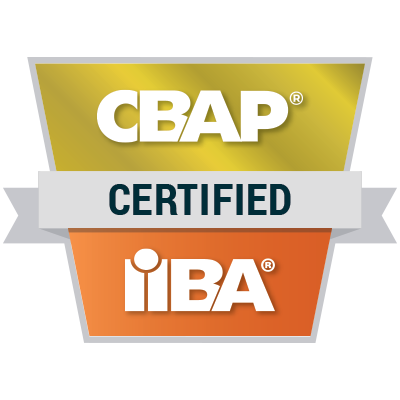5 Things You Need to Know Before Writing the CBAP Certification Exam
- What certification is: It is a digital badge and a digital certificate that states you passed the certification exam. But it is more than just a digital badge, it is an official validation that you have specific skills and expertise in business analysis.
- The difference between Knowledge-based and Competency-based certifications: They may sound the same but don’t be fooled. Knowledge-based certifications focus on content and learning objectives - if you have studied the materials and have some knowledge of business analysis you can demonstrate a sound understanding, whereas, competency-based testing focuses on outcomes, competencies, skills and performance and the scenario and case-study exam questions are designed to validate your proficiency level to prove you have the competencies required.
- CBAP is recognized internationally.
- CBAP proves you demonstrate the core competencies for this level of work. Certification may be required or asked for by an employer.
- CBAP recertification requires ongoing development and learning.

IIBA recently hosted a webinar panel discussion, ‘Why Get Certified?’ that discussed the value of certification and what you need to know about it. The Q&A discussion was flooded with questions and panelists Michael Roberts, Director of Customer Engagement at ASPE and Michael White, Founder and President of The Business Analysis Doctor, LLC ran out of time to get to all the questions. So, we’ve answered your CBAP certification questions below and in our recent blog, Why NOW is the Best Time to Earn a Business Analysis Certification and 3 Reasons Why Business Analysts Need Certification, we dive a little deeper into specialization certification questions (Agile, Business Data Analytics, Product Ownership).
Q: Which regions in the U.S. are you seeing more job opportunities for certified CBAP employees?
A: According to U.S. Bureau of Labor Statistics (BLS)*, employment of management analysts – including business analysts – is expected to grow 14% from 2018 to 2028, which is much faster than the average for all occupations. BLS reports for May 2018* showed that the median income for all management analysts, including business analysts, was $83,610. The middle 50% earned between $60,950 and $109,170. Salaries for the lowest 10% were around $48,360, while the highest 10% brought in upwards of $152,760. For specific regions in the US, Zippia.com has published a list of the top 10 states in the US hiring business analysts based on BLS data (including entry level salary, average salary, total jobs and location quotient) to determine their list: #1 – Virginia; #2 – Georgia, #3 – Washington, #4 – Texas, #5 – Illinois, #6 – Michigan, #7 – North Carolina, #8 – Alabama, #9 – Colorado, and #10 – Kansas. Another good resource to help you find the right state for you is to check on Glassdoor where you can search for jobs by region or employer.
Q: How can I improve my company’s BA roles and responsibilities definition with CBAP certification?
A: Professional certifications can be advantageous for your organization by giving your clients greater confidence in your business analysts skill sets, certification has also been shown to validate a professional’s knowledge which can lead to greater confidence and higher satisfaction which in turn boosts productivity and can reduce attrition. According to SHRM's skills gap research, 83% of HR professionals are having recruiting difficulty and of those HR professionals, 75% say there is a shortage of skills in candidates for job openings. Organizations today put the onus on skills development on the employee so by getting your whole team CBAP certified it raises awareness of the certification and your team’s skill level - and the boost in productivity will be noticed by management. You can also share industry articles and stats with your management team to educate them on the value of the business analysis role, so they truly understand the role of business analysis in helping them deliver better outcomes.
Q: What is the career path for a BA - how does certification help?
A: The business analysis career path can take you in a few directions depending on your personal preferences for the work environment, natural aptitude and interests, while certification can validate your experience, knowledge and capabilities. Participating in a Chapter Study Group or enrolling in an EEP™ training course will give you the most in-depth and peer-to-peer experience in addition to help prepare you to write your exam. If you are going to school look for a college or university that offers a business analysis certificate or diploma, IIBA has a list on their website. Look into IIBA certifications based on your work experience (hours) and any specialization areas you are interested in such as Agile, Digital, Data Analytics, Cybersecurity, Product Ownership, etc. Attending an IIBA Chapter meeting or industry conference or even reaching out to your IIBA LinkedIn group is a great way to connect with professionals working in different roles and industries who may be willing to answer some questions about the type of work they do and how they found their path. To get an idea of some of the roles for BAs look on Glassdoor and scroll through the different job descriptions requiring business analysis skills.
Q: How do I convince my boss to approve CBAP?
A: Share with your boss all the benefits of benefits of earning your CBAP® in an email or a PowerPoint presentation. Here’s a quick list you can share with your boss – 1) validates your knowledge so colleagues and customers are confident in your abilities, even before they start working with you; 2) increases your confidence which boosts happiness and productivity levels 3) share some industry articles and case studies that highlight how business analysis can play an important role in helping organizations increase efficiencies and effectiveness; 4) explain how the knowledge you will bring back to the team from preparing for your CBAP exam (especially if you participate in a Chapter Study Group and/or an EEP training course) will help you in your daily work. Another great reason (for you) to get your CBAP? The 2019 IIBA® Annual Business Analysis Salary Survey reports that the average salary of respondents with CBAP certification holders is 13% higher on average in earnings in comparison to non-certification holders.
Q: What is the difference between CBAP and PMI-PBA?
A: Both certifications assess the knowledge, skills and abilities of your work experience and skill level, so it really comes down to your personal preference or your employer’s certification goals, and whether you prefer a certification that covers business analysis from a more project based perspective (PMI is a project management association) or a fully encompassing, broader business analysis perspective (IIBA is a business analysis association). Here’s the difference broken down below, as you can see the qualifications are similar. The exams assess the knowledge, skills and abilities gained from both practical and learned experiences:
PMI-PBA - Secondary degree (High school diploma, associate degree or global equivalent). 7,500 hours (5 years) working as a practitioner of business analysis and 35 contact hours of education in business analysis. The exam is a 200-question, multiple-choice test.
IIBA’s CBAP – High school diploma or equivalent, associate degree or global equivalent preferred, 7,500 hours of Business Analysis work experience in the last 10 years. Within this experience, a minimum of 900 hours completed in 4 of the 6 BABOK® Guide Knowledge Areas, for a total of at least 3,600 of the required 7,500 total, and 35 hours of continuing professional development hours (CDUs) contact hours of education in business analysis, and provide two professional references. The exam consists of 120- scenario and case study-based multiple-choice questions which can be completed in person at a PSI test centre on virtually with a PSI online proctor. To learn more about CBAP review the list of competencies the exam covers and test yourself with the sample CBAP exam questions.
Q: What experience do I need to write my CBAP?
A: You need 7,500 hours of business analysis work experience and a minimum of 900 hours completed in 4 of the 6 BABOK® Guide Knowledge Areas (KAs). If you have less than the minimum required hours consider the CCBA certification.
Q: Where can I find sample questions to see if I’m ready to take the exam?
A: You can find some sample exam questions for every IIBA certification on the website, just visit the main Certification webpage, select the specific certification you want to know more about, read through the exam resources on the web page and scroll to the sample questions to test your knowledge. If you find you don’t know the content as well as you thought you did you can review the BABOK® Guide (members can choose from their free PDF or explore the new interactive online edition), if you are not a member you can purchase a copy from IIBA’s bookstore.
Q: How do I track my hours on the application form?
A: If you are preparing to write your CBAP application IIBA has a Core BA Certification Handbook to walk you through the steps. Aaron Whittenberger, Doug Goldberg and Laura Brandenburg all share some helpful advice on their CBAP experiences on Bridgingthegap.com.
Q: How can I prepare for my CBAP exam?
A: Depending on your individual learning style you can try self-study, IIBA LinkedIn Learning, IIBA endorsed education training provider (also called an EEP™) or join your local Chapter study group for some peer-to-peer support – check and see if your company has its own study group (some larger organizations offer this).
Q: What experience do I need to write my CBAP; work experience, hours, etc.?
A: IIBA lists all exam requirements on its certification web pages. The FAQ webpage will answer some of your questions and the CBAP exam page will answer all your exam day questions. Download the ECBA, CCBA, CBAP Core BA Certification Handbook for more answers to your CBAP prep questions.
Q: How can I get management support for training?
A: Ask your boss to support your continuing professional development through attending conference workshops, endorsed education training provider courses, taking your ECBA, CCBA, CBAP or IIBA specialized certification exams. If your manager has approved your CBAP or other certification request, ask for some time and support to help you prepare as earning your certification will benefit both you.
Q: Does IIBA offer discounts for training? I have a team of 8 professionals that need training.
A: IIBA’s corporate team can help answer your questions about corporate membership that will include IIBA memberships and training discounts. Connect with an Endorsed Education training provider to enquire about group discounts or reach out to your local Chapter to see if you can enroll all 8 of your employees in an upcoming Study Group. Some employers provide space in exchange for the Chapter Study Group being held at your location. If you need help connecting with your local Chapter contact IIBA at membership@iiba.org and they will help you explore a Study Group opportunity with your local Chapter.
Once you’ve earned your CBAP join IIBA’s CBAP LinkedIn Group, be sure to share your digital badge in your LI profile and share your CBAP story online using #CertificationsByIIBA #CBAP #CBAPOnline.
References
- Bureau of Labor Statistics, Occupational Outlook Handbook, U.S. Department of Labor, Management Analysts, on the internet at https://www.bls.gov/ooh/business-and-financial/management-analysts.htm (accessed November 7, 2019).
- Zippia.com. https://www.zippia.com/research/business-analyst-best-states/
- SHRM. https://www.shrm.org/resourcesandtools/tools-and-samples/toolkits/pages/developingemployees.aspx
